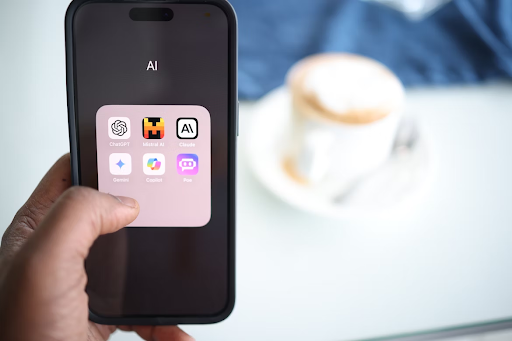
Artificial Intelligence seemed like a dream of the distant future up until a few years ago. In 2025, however, it’s no longer a futuristic concept but very much an everyday reality. With the rise of generative tools and other AI productivity apps, a lot of industries are becoming automated like never before.
Whether we talk about conducting research on complicated topics or finding leading magyar kaszinók bónuszkóddal, AI can help significantly cut down the time it takes to get important work done. Not only that, but AI apps for startups are also changing the way new businesses are created and grown, unlocking new opportunities for entrepreneurs.
Table of Contents
Key Benefits
There are several benefits to using computer vision mobile apps and others that help startups find their footing. Here are some of the most significant ones:
- Elevating the User Experience: Users today expect their apps to anticipate their needs and provide relevant content. These are areas where AI shines. Machine learning can adapt content in real-time and provide results that users are most likely to engage with.
- Automation: This is key when it comes to AI-powered mobile apps designed particularly for startups. Chatbots with natural language processing powering them can handle customer service on a 24/7 basis, reducing the manual workload for startups. Image recognition tools take care of processes like document verification. Analytics powered by AI helps businesses improve their services without conducting extensive A/B testing.
- Scalability: As startups grow beyond a certain point, AI development tools 2025 can grow with them. Applications can assist in managing traffic spikes, predicting infrastructure needs, and optimizing back-end processes without having to deal with any technological bottlenecks that traditionally cause issues when expanding.
Examples of AI Mobile App Trends 2025 for Startups
A number of AI startup success stories have come up in 2025. Here are some mobile apps that have made it to the mainstream already:
Cleo (Fintech)
Managing personal finance is much easier with Cleo. This conversational artificial intelligence application interacts with users via chat and provides budget recommendations, financial coaching, and spending insights. What sets it apart from traditional tools is its ability to adapt its tone to the user’s personality, which leads to a very engaging experience.
Replika (Mental Health)
Some of the best AI apps 2025 are focusing on mental health and wellness. Replika is leading the way among these with its conversational companion that learns from user interactions and improves its responses over time. It helps users deal with stress, anxiety, and loneliness by offering empathetic and helpful responses.
Lensa (Photo Editing)
Automatically enhancing images, generating digital avatars, and applying unique and creative filters is very easy with Lensa. It uses facial recognition and enhancement features to work with very little input from the user, making it a reliable way for content creators to treat their visuals. Lensa is a great example of how artificial intelligence is able to bridge the gap between professional tools and user-friendly experiences. It’s not long before we start seeing software like this help even in the development of cinema in new and innovative ways.
ELSA Speak (EdTech)
When it comes to natural language processing apps, one excellent use case is language learning. ELSA Speak enables this, unlike ever before, thanks to its real-time pronunciation feedback and customized lessons. It helps with accent training as well and has a hyper-personalized experience for non-native English speakers. It’s an excellent example of how startups can use AI-powered experiences to offer educational tools without requiring human instructors.
Challenges and How to Overcome Them
Even though AI-powered UX design and other software have countless benefits, there are real challenges that must be dealt with.
Data Dependency
Such systems cannot work without huge amounts of data. This isn’t easy for early-stage startups, especially since they need to comply with privacy regulations. To overcome this barrier, companies often rely on open-source datasets or user-consented data collection practices.
Computational Resources
Training smart models requires a ton of processing power. This is highly expensive for new companies. However, cloud-based platforms like Google Cloud AI and Microsoft Azure have made advanced computing easier and more accessible. This allows startups to deploy their models without their own infrastructure.
Ethical Concerns
Depending on the data used to train machine learning in mobile apps, it can end up reinforcing stereotypes or excluding certain user groups. To ensure this doesn’t happen, companies must adopt responsible practices, such as regular audits of their data sets and inclusive design principles.
Trustworthiness
This is still a very new piece of technology, especially in the mainstream. It’s vital for companies to build trust through clear privacy policies and explain how user data is collected and used. As time goes on, people are generally becoming more concerned about their personal information, and giving it all up to AI is a scary proposition unless they understand how these technologies work.
Talent Acquisition
With AI specialists in such high demand, startups can’t compete with big tech to get the best talent on board. Some companies are overcoming this barrier by using no-code or low-code development platforms that allow smaller teams to build intelligent models without high technical expertise.
Conclusion
Moving into 2026, the future of artificial intelligence in applications seems boundless. From AI app monetization strategies to software helping people deal with their emotions, the possibilities of automation in pretty much every major industry are unlimited. The widespread rollout of 5G is only going to accelerate this process, bringing real-time processing to more people around the world. It’s only a matter of time before we see artificial intelligence make its way to every aspect of our digital lives, from work and entertainment to health and security.
RELATED ARTICLES
Latest Articles
 Jagermeister 750ml Price in India: Full …In Whisky Prices
Jagermeister 750ml Price in India: Full …In Whisky Prices Building a Scalable Payment Infrastructu…In Technology
Building a Scalable Payment Infrastructu…In Technology Tech-Savvy Ways to Streamline Your Finan…In Business
Tech-Savvy Ways to Streamline Your Finan…In Business Magic Moments Vodka Price in India: Size…In General
Magic Moments Vodka Price in India: Size…In General The Role of Claims Agencies in Holding A…In Tips
The Role of Claims Agencies in Holding A…In Tips How Embracing Cloud‑Native Strategies Tr…In Technology
How Embracing Cloud‑Native Strategies Tr…In Technology Poorvika Mobiles Pun: Best Place for You…In Technology
Poorvika Mobiles Pun: Best Place for You…In Technology Why Choosing the Right NEET Coaching Mak…In Education
Why Choosing the Right NEET Coaching Mak…In Education
stopie.com is a participant in the Amazon Services LLC Associates Program, an affiliate advertising program designed to provide a means for sites to earn advertising fees by advertising and linking to Amazon.com.
Clicking on an Amazon link from stopie.com does not increase the cost of any item you purchase.
We will only ever link to Amazon products that we think our visitors may be interested in and appreciate learning more about.



